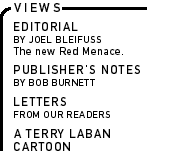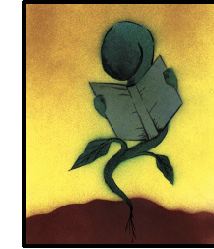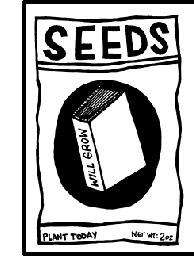

|

|

|

|
| |
|
|||||
|
Smashmouth: Two Years in the Gutter Down & Dirty: The Plot To Steal the Presidency My friend Mike Butkus is a precinct captain on Chicago's Northwest Side. He's been in the political game since the '70s, when Old Man Daley ran the city, so he's seen some dirty campaigns. But last fall's presidential election, he told me one night as we were shooting darts, "was the biggest rip-off in the history of the world. Al Gore got totally jagged." Every time I see him, Mike is carping about George W. Bush. "He's an idiot." "He's a jag-off from Texas." "He's gonna fuck over Chicago." When we had lunch together right after St. Patrick's Day, Mike not only brought his grievances, he brought two brand-new books. "What's this?" I said, as we slid into a window booth at Kevin's Hot Dog Heaven. "I've
"First two books about the election." Mike rapped the covers with his knuckles. "Already?" "I read 'em both over the weekend. Couldn't stop. My kids were tryin' to get me to watch the NCAAs, and I said, 'Get outta my face. I'm readin'.' Finally, they pushed my chair out of the room so they could watch TV. I just kept goin'." Mike thinks I'm a liberal goo-goo because I put Adlai Stevenson and Eugene McCarthy in my pantheon of Democratic heroes. He says those guys were losers compared to real politicians like LBJ and the Old Man. "If you wanna understand what politics is really about, take these books home and read 'em," he insisted. Smashmouth, the campaign diary of Washington Post gadabout Dana Milbank, tries to persuade us that politics is war by other means. The best campaigns are eye-gouging, groin-kicking, sand-in-the face brawls: "In the smashmouth world of politics, if you don't differentiate yourself and say what's wrong with the other guy, you aren't going to win." For decades, the Democrats nominated milk-and-water liberals who went out onto the stump and apologized for everything the party stood for. In Al Gore, they had a candidate who was willing to play dirty. He once vowed to "rip the lungs out" of anyone who stood between him and the presidency. That doesn't sound like a Michael Dukakis soundbite. Early in the campaign, Gore stole a Republican tactic, and hammered Bush not only for what he believed, but for who he was, and where he came from. His campaign strategy was to portray Texas as "a polluted, illiterate, gun-toting backwater." Meanwhile, on the Republican side, Bush was trying hard not to come off as a meanie. Bush campaigned from the middle of the road, but nobody--Milbank included--seemed to notice that all his buddies were standing on the right-hand shoulder. Even though Smashmouth has a 2001 copyright date, it includes nuggets like "there are many reasons for liberals to like some of Bush's ideas," and "for conservatives, these are not the best of times. The only serious candidates are George W. Bush and John McCain, both of whom are running as moderates." You'd think this would make the book obsolete already, but future candidates could use it as a manual on How to Succeed In Politics By Really, Really Lying. Nowadays, one of the difficulties of writing a campaign book is telling us something
Once the Nice Guys were eliminated, it turned out that the Democrats showed a darker side than the Republicans. The Republican convention was like an Up With People! concert, but the Democrats brought in Bill Daley, the Old Man's son, who sounds like the stoic, murderous Victor the Cleaner from La Femme Nikita. Mike's kind of guy. "He got his doctorate in politics in Chicago," says Chuck Campion, a Democratic consultant and friend of Daley's. "Most politics is Cub Scouts. They're Hell's Angels." As bad as he wanted to be, Gore couldn't do any better than a tie in the election. Milbank thinks it's because the vice president turned into a softie after his obnoxious, shut-up-while-I'm-trying-to-talk performance in the first debate. He cites a poll that shows most voters thought Gore was more unfair in the debate, but also that he was more effective. Americans love bad boys. "In the second debate, when Gore heeded advisers and pundits and toned down his attacks, his performance was far worse," Milbank writes. "The neutered Gore still hasn't recovered on the eve of the election." The real campaign, where power-hungry nastiness was all that mattered, occurred in Florida, after the voting was done. In Down and Dirty, Salon.com correspondent Jake Tapper makes both parties sound like looters scuffling over a television set. The election in Florida was so close, the public's verdict so ambiguous, that either guy could have won if the ballots had been counted the "right" way. (The Miami Herald recounts prove that. The Bush-Gore election turned out to be like a hypertext novel, with several alternate endings.) This was where the Democrats reverted to the wimpiness they perfected in the '70s and '80s. The Republicans had two big advantages during the recount: the country club faction's sense of entitlement, and the yahoo wing's conviction that God had enlisted them in a jihad to make George W. Bush president. As soon as Faux News election director John Ellis ordered his network to call Florida for his cousin George, "the Bushies have decided on one message: Bush won, and everything that happens from this moment on is crazy, illegitimate, Gore-propelled nonsense." That scorn was personified by Bush's recount "general," James Baker, who projected the intolerant wrath of a 16th-century Spanish cardinal. After the Florida Supreme Court decided to allow Gore's hand recounts to continue, "Baker and his crew are livid," Tapper writes. "They are, after all, the types who are used to getting their way. They've been getting their way their entire lives." From the very beginning, Bill Daley was "pessimistic" about Gore's chances. The
By the end, Tapper concludes that the battle for Florida had nothing to do with fairness, or democracy, or the Constitution. It was "a war between thieves," with one principle: power. And power goes to the most ruthless. While Gore was appearing on TV to smilingly beg for patience, Bush's people were cheating shamelessly. Tapper includes an entire chapter on a Bush plan to persuade white servicemen to vote after the election. He never proves it happened, but he notes that a suspicious surge of ballots arrived a week after November 7. The Democrats, still scarred by their Cold War-era image as unpatriotic pinkos, backed down on their attempt to challenge the votes. "The Gorebies are gun-shy, wimpy," Tapper writes, "while the Bushies are hungrier, more willing to do anything they can to win." As soon as I turned the last page of Down and Dirty, I called up Mike. I was shaken. I couldn't believe such things could happen in a democracy, I told him. "The American people don't like dishonest elections," I said. "I'm sure there will be a backlash against the Republicans once the public reads this book." "Remember the backlash against Kennedy after the Old Man helped him steal the presidency? Remember when LBJ cheated his way into the Senate, how much it hurt his career?" Mike asked. "Have you seen any riots against Bush?" "Well, there have been some demonstrations ..." "You think he cares? Last I looked, 60 percent of the country thought he was a good guy." "I guess everybody loves a winner," I said. "You got it!" Mike bellowed into my ear. "You finally got it! I'm gonna introduce you to the ward committeeman." Mike's going to start me off slowly in real-life politics. Next
year, we may go out to the Republican neighborhoods around O'Hare
Airport and write "overflowing garbage" tickets for people with
the wrong yard signs. If I do a good job, he promises me, someday
I can help steal an election. Robert McClelland recently joined his ward's Regular Democratic Organization.
|




